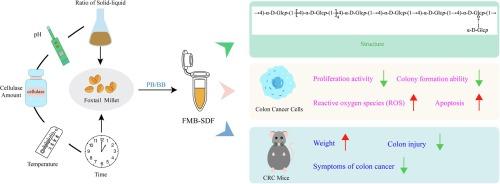Extraction optimization and structural characterization of soluble dietary fiber in foxtail millet and its inhibitory activities on colon cancer
Abstract
Soluble dietary fiber has anti-tumor effect and is closely related to human health. At present the structure of soluble dietary fiber from foxtail millet (FMB-SDF) and its anti-tumor effect remain unclear. In this study, the structure of FMB-SDF was characterized, and its effects on the colon cancer were investigated. The results showed that under optimal extraction conditions the yield of FMB-SDF was 14.25 %. Based on the monosaccharide composition, methylation results and NMR analysis, the preliminary structure of FMB-SDF was inferred to be a glucan. Interestingly, FMB-SDF markedly inhibited the colony formation ability of HCT116 and HT-29 cells and could significantly induce the increase of reactive oxygen species (ROS) and apoptosis of HCT116 and HT-29 cells. The results of animal experiments showed that FMB-SDF could significantly alleviate clinical symptoms of colon cancer in mice. These results provide a theoretical basis for the exploitation and utilization of FMB-SDF against colon cancer.


| 公司名称 | 产品信息 | 采购帮参考价格 |
|---|---|---|
| 上海源叶 |
cellulose
|
 求助内容:
求助内容: 应助结果提醒方式:
应助结果提醒方式:


